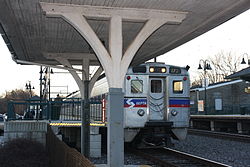George K. Heller School | |
 George K. Heller School, west wing. | |
| Location | 439 Ashbourne Road, Ashmead Village, Cheltenham Township, Pennsylvania |
|---|---|
| Coordinates | 40°03′43″N75°05′56″W / 40.0619°N 75.0990°W |
| Area | 1 acre (0.40 ha) |
| Built | 1883 |
| Architect | Pool, Samuel T. |
| Architectural style | Late Victorian |
| NRHP reference No. | 01000461 [1] |
| Added to NRHP | May 2, 2001 |
The George K. Heller School, also known as the Cheltenham Center for the Arts, is a historic school building located in Ashmead Village, Cheltenham Township, Montgomery County, Pennsylvania. It was originally built in 1883 to house the first Cheltenham High School, and expanded in 1893 and 1906. Later additions took place between 1963 and 1969, after it was converted to the Cheltenham Center for the Arts. The stone school building ranges from 1 1/2- to 2 1/2-stories and has intersecting gable roofs. The roof is topped by a square cupola. A school was located on this site as early as 1795 and it was considered the oldest public school site in continuous use at the time of its closing in 1953. [2]
Contents
It was listed on the National Register of Historic Places in 2001. [1]






